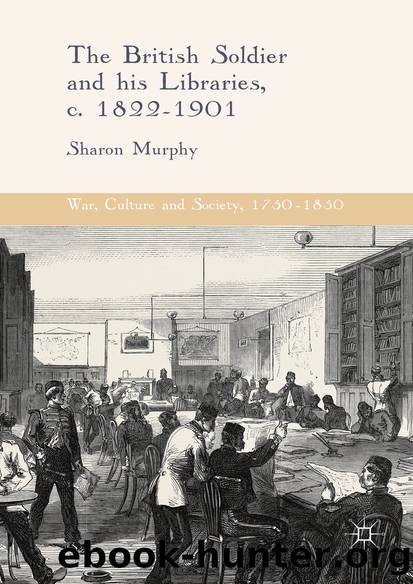The British Soldier and his Libraries, c. 1822-1901 by Sharon Murphy

Author:Sharon Murphy
Language: eng
Format: epub
Publisher: Palgrave Macmillan UK, London
The armyâs decision to begin to establish libraries for non-commissioned officers and soldiers in the late 1830s represented a major shift in attitude on the part of authorities and was a consequence of several factors: In the first place, the army had before it the example of those regiments that had already begun to set up libraries for themselves overseas, although many of theseâat least at firstâwere intended for the exclusive use of officers.13 Secondly, concerned individuals and societies had also made increasing efforts from the early 1800s to provide reading materials for those who found themselves on the ships of either His Majesty or the merchant navy, and suggested that this was something that should not be neglected. The influence of the Quaker Elizabeth Fry and her Ladiesâ Committee of Prison Reformers was also important, for these, too, tried to persuade the government to take âa more active role in libraries for prisoners, as well as sailors and soldiers.â14 And, of course, the East India Companyâs libraries had by this time been up and running in India since the early 1820s, and Regular Army soldiers were clearly appreciative of their presence on the subcontinent.
According to Colonel John Henry Lefroy, however, who was appointed as the Inspector-General of Army Schools in 1857, the armyâs shift in attitude toward the provision of libraries for soldiers was primarily âan indirect result of the remarks of the Inspectors of Prisons in Great Britain ⦠on the imprisonment of military offenders.â15 In their 1837 report, the Inspectors had observed that the âdark cellsâ to which military offenders were typically consigned had âthe effect of hardening and brutalizing those ⦠confined in them ⦠It may be also proper to remark, that in a light cell the salutary effect of reading and instruction may be expected.â Crucially, the Inspectors also revealed that their preoccupation with the possible reading and instruction of military offenders arose directly from their conviction that too much emphasis was being placed by the army on punishing âbad soldiersâ; much more should be done, they stressed, to ârewardâ and âencourageâ the âgood soldier,â who was often overlooked among the troops:Nothing would have a greater influence in encouraging good habits, and in supplanting bad ones; in raising the tone of discipline, and the general character of the soldiery, than the consulting [of] the comforts and interests of the good soldier, and the conferring upon him those marks of distinction upon which the men greatly pride themselves, and which, however intrinsically slight, are, in the soldierâs esteem, of the very highest value, and a source of the very greatest gratification.16
Download
This site does not store any files on its server. We only index and link to content provided by other sites. Please contact the content providers to delete copyright contents if any and email us, we'll remove relevant links or contents immediately.
| Africa | Americas |
| Arctic & Antarctica | Asia |
| Australia & Oceania | Europe |
| Middle East | Russia |
| United States | World |
| Ancient Civilizations | Military |
| Historical Study & Educational Resources |
Magic and Divination in Early Islam by Emilie Savage-Smith;(1534)
Papillon by Henry Charrière(1440)
Bohemians, Bootleggers, Flappers, and Swells: The Best of Early Vanity Fair by Bohemians Bootleggers Flappers & Swells- The Best of Early Vanity Fair (epub)(1419)
Ambition and Desire: The Dangerous Life of Josephine Bonaparte by Kate Williams(1394)
Twelve Caesars by Mary Beard(1324)
What Really Happened: The Death of Hitler by Robert J. Hutchinson(1167)
Operation Vengeance: The Astonishing Aerial Ambush That Changed World War II by Dan Hampton(1164)
London in the Twentieth Century by Jerry White(1149)
The Japanese by Christopher Harding(1134)
Time of the Magicians by Wolfram Eilenberger(1131)
Twilight of the Gods by Ian W. Toll(1123)
Lenin: A Biography by Robert Service(1080)
The Devil You Know by Charles M. Blow(1028)
A Social History of the Media by Peter Burke & Peter Burke(985)
Freemasons for Dummies by Hodapp Christopher;(966)
Napolean Hill Collection by Napoleon Hill(948)
Henry III by David Carpenter;(924)
The Rise and Triumph of the Modern Self by Unknown(923)
Richard III (The English Monarchs Series) by Charles Ross(913)
